 A boy stands next to a donkey loaded with jerry cans by the Atbarah river near the village of Dukouli within the Quraysha locality, located in the Fashaqa Al-Sughra agricultural region of Sudan's eastern Gedaref state. - AFP
A boy stands next to a donkey loaded with jerry cans by the Atbarah river near the village of Dukouli within the Quraysha locality, located in the Fashaqa Al-Sughra agricultural region of Sudan's eastern Gedaref state. - AFP
KHARTOUM: At least 50 people have been killed in four days of violence in Sudan's Darfur, medics said yesterday in a revised toll. El Geneina, capital of West Darfur and close to the border with Chad, has seen days of fighting including gunfire and shelling, residents said. The West Darfur Doctors' Committee said its latest count "raised the total numbers since the start of the events to 50 dead and 132 wounded." "Despite relative calm since (Monday) night, medical teams continue to find it very difficult to move," it said in a statement. The UN humanitarian coordination office OCHA had on Monday reported 40 dead and 58 wounded in clashes pitting Arab tribes against the non-Arab Massalit ethnic group in El-Geneina.
El-Geneina resident Mohamed Abdel Rahman told AFP over the phone yesterday: "There was calm overnight but this morning we heard gunfire from Hay Al-Jabal district which lasted almost an hour." Another resident three kilometers from Hay Al-Jabal, who asked to remain anonymous, said he had also heard gunfire. Authorities on Monday night declared a state of emergency and deployed troops to West Darfur. The region was the epicenter of years of bloodshed starting in 2003 under then president Omar Al-Bashir. Ethnic minority groups complaining of marginalization had taken up arms against the central government, which responded by unleashing armed groups largely made up of Arab nomads.
Bashir is wanted by the International Criminal Court on charges of genocide over the conflict, which the UN says left 300,000 people dead and displaced more than 2.5 million. Bashir's iron-fisted rule was ended by the army in April 2019 following months of mass protests. Sudan's transitional government in October signed a peace deal with several rebel groups, including in Darfur-but certain factions did not sign the accord. Eyewitnesses said fighting still raged on Monday afternoon, as thick smoke billowed over El Geneina. "We stayed in our homes, but we've been hearing gunfire close by-a shell landed at our neighbor's home," said Adam Issa, another resident.
The West Darfur Doctors' Committee said an ambulance carrying wounded victims was attacked. Clashes often pit nomadic Arab pastoralists against settled farmers from non-Arab ethnic groups. Saleh Issa, another El Geneina resident, said he saw a "cloud of smoke" covering swathes of the city.
Meanwhile, US Secretary of State Antony Blinken on Monday pressed for an easing of tensions between Sudan and Ethiopia as fears grow of a spillover from the bloody Tigray conflict. In a telephone call with Sudanese Prime Minister Abdalla Hamdok, Blinken raised "the need to de-escalate tensions between Sudan and Ethiopia over the Al-Fashaqa border area, including recent commitments to engage in dialogue to resolve the issue," State Department spokesman Ned Price said.
The fertile area claimed by both countries has seen a rise in skirmishes as Sudan sends in troops, which Ethiopia has described as an invasion. The farmland borders Ethiopia's Tigray region where Addis Ababa launched an offensive against the local leadership in November, sending some 60,000 refugees fleeing into Sudan. The United States has been increasingly critical of Ethiopia, a longstanding ally, with Blinken earlier saying that the Tigray campaign involved "ethnic cleansing."
The State Department welcomed a weekend announcement by Ethiopian Prime Minister Abiy Ahmed that troops from neighboring Eritrea, accused of perpetrating atrocities, had begun a promised withdrawal from Tigray. "We are encouraged by the prime minister's announcement that the government of the state of Eritrea has agreed to withdraw its forces from Ethiopia," Price told reporters. "The immediate and complete withdrawal of Eritrean troops from Tigray will be an important step forward in de-escalating the conflict and restoring peace and regional stability."
US relations have warmed markedly with Sudan since Hamdok, a civilian, took office in a transitional government following the toppling of Omar Al-Bashir. Sudan last week paid $335 million in compensation over anti-US attacks from when Bashir welcomed Al-Qaeda as part of an Islamist turn in the 1990s. Blinken separately hailed Sudan's signing of an agreement with a rebel faction, the Sudan People's Liberation Movement-North.
Blinken also discussed the latest attempts to jumpstart diplomacy on the massive Grand Ethiopian Renaissance Dam, which Addis Ababa is moving ahead on despite protests from Sudan and Egypt which rely heavily on Nile water. US-led talks under former president Donald Trump failed to reach a resolution. The United Arab Emirates recently became the latest to offer to mediate. - AFP




